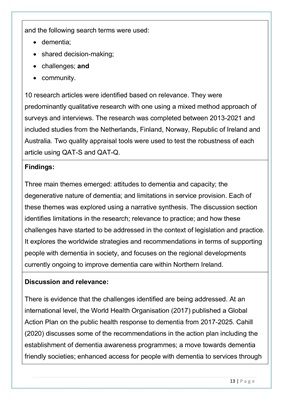
13 | P a g e
and the following search terms were used:
• dementia;
• shared decision-making;
• challenges; and
• community.
10 research articles were identified based on relevance. They were
predominantly qualitative research with one using a mixed method approach of
surveys and interviews. The research was completed between 2013-2021 and
included studies from the Netherlands, Finland, Norway, Republic of Ireland and
Australia. Two quality appraisal tools were used to test the robustness of each
article using QAT-S and QAT-Q.
Findings:
Three main themes emerged: attitudes to dementia and capacity; the
degenerative nature of dementia; and limitations in service provision. Each of
these themes was explored using a narrative synthesis. The discussion section
identifies limitations in the research; relevance to practice; and how these
challenges have started to be addressed in the context of legislation and practice.
It explores the worldwide strategies and recommendations in terms of supporting
people with dementia in society, and focuses on the regional developments
currently ongoing to improve dementia care within Northern Ireland.
Discussion and relevance:
There is evidence that the challenges identified are being addressed. At an
international level, the World Health Organisation (2017) published a Global
Action Plan on the public health response to dementia from 2017-2025. Cahill
(2020) discusses some of the recommendations in the action plan including the
establishment of dementia awareness programmes; a move towards dementia
friendly societies; enhanced access for people with dementia to services through